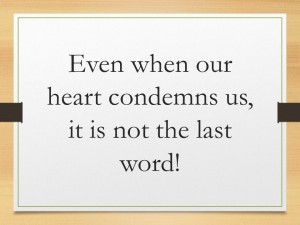“for whenever our heart condemns us, God is greater than our heart, and he knows everything”(1 John 3:20).
1 John is a letter about grasping for certainty in salvation. John writes “that you may know that you have eternal life”(1 John 5:13) and gives a series of indicators to tells us how we can be certain we truly belong to the Lord. Often we focus so much on these tests, though, that we forget the source of our hope. It’s not my perfect obedience—not my good and honest heart—not my flawless understanding of God’s word—that is the basis of my hope of salvation. It is a loving, gracious God who has deigned to deal with me, offer himself, and work in me according to his pleasure.
 It is this redirection of our attention that John intends with this statement: “By this we shall know that we are of the truth and reassure our heart before him; for whenever our heart condemns us, God is greater than our heart, and he knows everything”(1 John 3:19-20). Even when our heart condemns us, it is not the last word! God is greater than my heart, and it is his verdict that matters! He can save the person who feels guilty and inadequate, weak and insecure, discouraged and disconsolate. Two encouragements spring from this passage.
It is this redirection of our attention that John intends with this statement: “By this we shall know that we are of the truth and reassure our heart before him; for whenever our heart condemns us, God is greater than our heart, and he knows everything”(1 John 3:19-20). Even when our heart condemns us, it is not the last word! God is greater than my heart, and it is his verdict that matters! He can save the person who feels guilty and inadequate, weak and insecure, discouraged and disconsolate. Two encouragements spring from this passage.
1) Insecurity is an age-old problem
Questioning our relationship with God did not begin with our time. Insecurity is not modern psycho-babble. New Testament Christians struggled with questions like whether “we know that we have come to know him”(1 John 2:3), or “who are the children of God and who are the children of the devil”(1 John 3:10) or how to “know the Spirit of truth and the spirit of error”(1 John 4:6). Even people who knew apostles like John—and perhaps John himself!—sometimes felt that “our heart condemns us”(1 John 3:20).
Talking to Christians today reveals the same issue. We ask one another how we can be sure of our salvation. Preachers regularly field questions about when sin becomes sin, or how much sin leads to loss of relationship with God, or about the proverbial man who curses while being hit by a car.
And, I must confess, the issue is deeply personal for me. Just this week I have found myself selfish and angry—and it’s only Tuesday! While I try not to let evil thoughts, attitudes, words, or actions linger (or go uncorrected), the net impact of my weaknesses and failures leaves me feeling utterly unworthy of a relationship with God. With disturbing regularity my heart condemns me.
It is refreshing to know that such thoughts are not wildly off-course. Insecurity has always been an issue—an issue for which there is only one answer.
2) God is greater than how I feel
“For whenever our heart condemns us, God is greater than our heart, and he knows everything”(1 John 3:20). The concept is so simple that we may pass by its profundity. Thankfully, God’s running of his universe is not contingent on how I am feeling. God is not grumpy because I am (though I sometimes may feel that way when I’m grumpy!). People’s moods are notoriously fickle and unstable. Basing something as important as my eternal salvation on something as ephemeral as my emotional state is supremely ridiculous. My feelings don’t change reality, and they don’t determine what God thinks of me. The implication of this verse is that God is still able to save me, even when I feel unworthy of salvation—because God is greater than how I feel.
None of this means that we can throw off the shackles of discipline and live in sin without reservation, trusting that God will save us despite this. John encourages us to “walk in the light”(1 John 1:7) and to “keep his commandments”(1 John 2:3) and not to love the world (1 John 2:15) and to love our brothers (1 John 3:10) and to practice righteousness (1 John 3:10). A life of sin is not an option for a child of God. But the issue is that when we try to give our lives to the Lord, we still fall short. We make mistakes. We confess them and come back to the Lord (1 John 1:8-10), but each repetition of this cycle reinforces our unworthiness. It is to such a heart that God speaks words of sweet reassurance. God is greater than our heart!
But there is more. “Beloved, if our heart does not condemn us, we have confidence before God; and whatever we ask we receive from him, because we keep his commandments and do what pleases him”(1 John 3:21-22). If we find nothing against ourselves—if we trust fully that God is with us despite our weakness—then it opens up new vistas of service. Now we are bold and confident before him, asking with the assurance of a favored son or daughter. We know that our lives are in resonance with our creator. We know to whom we belong and where we are headed. Yet this feeling doesn’t somehow become a new barometer of our salvation. Even when I feel great, God remains greater than how I feel.
Give God your heart and life. Try to love like he loves. Confess and abandon sin you discover in your life. Trust and obey him—and rest easy!
by Jacob Hudgins
jacobhudgins@yahoo.com

